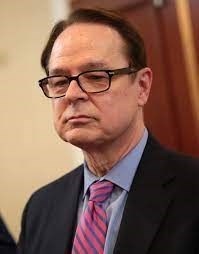
OBITUARIO
David Douglas Boaz
29 agosto, 1953 – 7 junio, 2024

Born in the small town of Mayfield Kentucky in 1953, David was intrigued by politics and policy from a young age—both his father and grandfather had been elected judges, and his mother studied economics. A spelling bee champion, class valedictorian, and National Merit Scholar, he inherited their sharp intellects. He first discovered libertarian ideas in high school, when he picked up a copy of Henry Hazlitt’s Economics in One Lesson from his mother’s shelf.
A few months after graduating from Vanderbilt University in 1975, he made his way to the Libertarian Party nominating convention in New York, where he would meet the leaders of a burgeoning libertarian movement. David co-managed Ed Clark’s 1978 campaign to become governor of California, and later also worked as research director on Clark’s 1980 presidential campaign as the Libertarian Party nominee. In 1981, Cato Institute founder Ed Crane invited David to join his upstart new think tank dedicated to advancing libertarian ideas.
For more than four decades as Cato’s vice president for public policy and executive vice president, David went on to play an indispensable role in Cato’s development into a leading think tank, and was a foundational figure of the libertarian movement. His books—including the The Libertarian Mind: A Manifesto for Freedom and The Libertarian Reader—are the ultimate resources for libertarian ideas. When the Encyclopedia Britannica needed an entry on libertarianism, they went to David.
David was a cherished mentor and teacher to countless people around the world. He was incredibly generous with his time—his door was open to all to share thoughts and ideas. Known for his exacting standards, he demanded a high level of thinking and writing, and yet was always kind and fair-minded.
He was an authoritative commentator on everything from education choice and the growth of government to drug legalization and marriage equality. His articles have appeared in the Wall Street Journal, the New York Times, the Washington Post, the Los Angeles Times, and National Review. His quick wit and succinct explanations of libertarian principles made him a frequent guest on national television and radio shows.
He is survived by his partner and support for 30 years, Steve Miller; brother Tommy Boaz (Angie); sister Mary Boaz (John Perry); nieces Jennifer Boaz Davis and Brittany Boaz Titzer (Heston); and great-nieces Cameron and Kendall Davis. He was predeceased by his parents, Seth T. Boaz, Jr. and Martha P. Boaz. A service will be held at National Memorial Park on June 10.
Muestre su apoyo
Comparta Un Recuerdo
Comparta
Un Obituario
Obtenga actualizaciones
Servicios
COMPARTA UN OBITUARIOCOMPARTA
- RECIBIR RECORDATORIOS
v.1.18.0